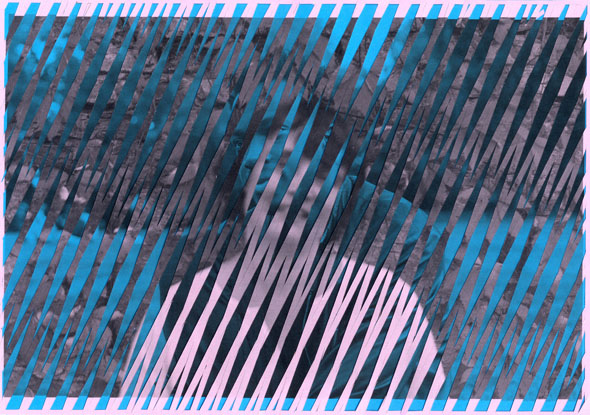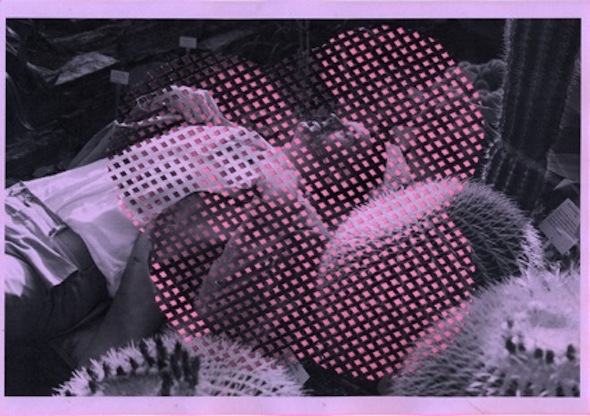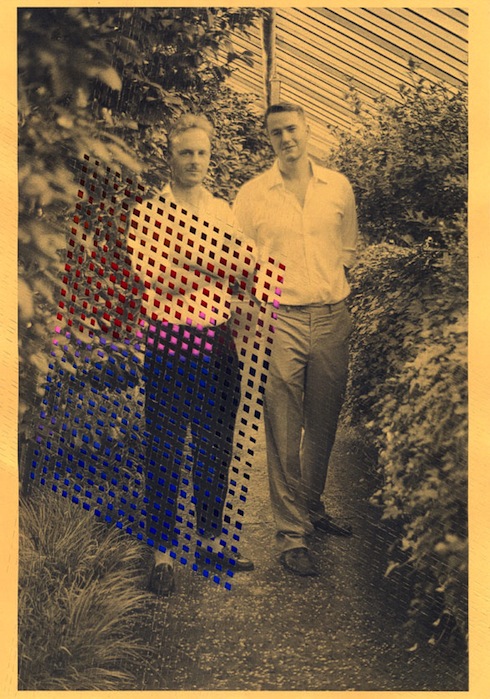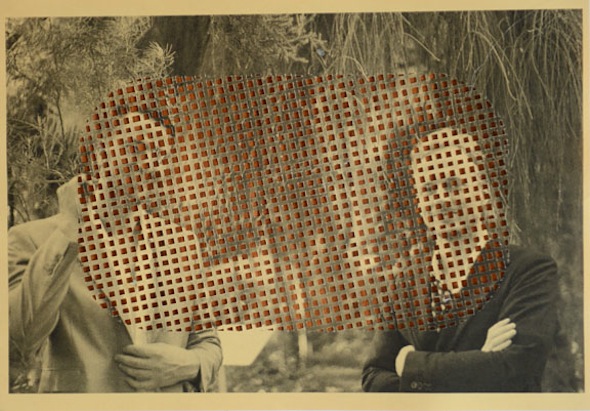 Melissa Steckbauer, Untitled (2012) 21cm x 29.7cm
Melissa Steckbauer, Untitled (2012) 21cm x 29.7cm
Interview by Melissa Steckbauer in Berlin; Monday, July 23, 2012
Introduction
As part of Kunst braucht Fläche, a public art installation project in Berlin, artist Melissa Steckbauer conducted the following two interviews on the topic of “intuition”. The first interview is with Ashema Wierowski, the owner of the Be-Touched massage studio in the Kreuzberg neighborhood of Berlin.
The second interview is with Stephen Molloy & Gunnar Rönsch, the architectural team making up The Fundamental Group .
The Kunst braucht Fläche installation is on view at Greifswalderstr. 223 until August 5, 2012.
Interview – Part 1: Ashema Wierowski
MELISSA STECKBAUER: How can you tell when you’re intuition is communicating with you vs. your mind or other voices?
ASHEMA WIEROWSKI: Mostly it’s when I’m taking a break and not acting immediately, trying to feel the situation. Then it’s my intuition and not my mind.
Do you meditate before you massage your clients?
Yes.
Do you have repeated routines that you practice; ritual activities that help you to stay centered?
Mostly I’m just sitting still and trying to stay centered; to be present and not drift into thinking and images, to be there with the breath, with whatever is.
How long have you been working with improving your intuition?
Consciously, maybe for seventeen years now. I started my spiritual work when I was thirty.
What were some of the more effective practices that you’ve learned on the way?
Well meditation because that’s just something that comes quite naturally to me. It’s not so difficult for me when I sit down, to be quiet.
What were some of the struggles that you came into contact with over time in trying to learn to be more present or to be more connected to your own feelings?
Distraction is just so easy. It’s always there and it’s sometimes really nice to always be distracted with tons of things. Movies, music, dreaming, just chatting to people.
What are the benefits of utilizing your intuition?
I feel better. I have the feeling of self, more; it’s just me. When I’m working with intuition consciously, also when I’m with clients on the massage table, it’s really me and it’s not some pattern, some learned stuff from the past.
I wonder if you have a place in your body that alerts you to information.
I think for me it’s mainly the chest. Also when I’m doing energy work it’s always the opening coming from the chest area.
Do you use words like chakra?
Ya.
Something to do with the heart chakra for example?
Ya.
Do you feel that this is somehow different from your own pragmatic beliefs? Because you seem very grounded and very down-to earth to me so I imagine that there’s a balance, between the lifting in terms of a spiritual practice and the strongly material. Do you feel this?
I feel it constantly yes, and it’s a struggle for me. In the material world I’m kind of losing myself because then I’m not too intuitive. It’s then more the distracting part that clicks in. It’s very high speed: going and doing.
So when do you feel most at home? Just in terms of activity?
When I’m massaging, when I’m doing bodywork.
And what does it feel like?
It’s just…me. There’s nothing else to say, it’s just…really me.
And how do you think the people feel about it? In terms of actual verbal feedback that they give as well as the sense that you have from them in terms of the way they receive you or experience you?
They come back so that’s a good sign. And then I hear how people receive the massage and not only physically but also how they felt emotionally. And that just shows me that what I am doing is what I am here for.
Can you imagine another thing in life that would make you feel as fulfilled? Maybe if circumstances were different.
It’s difficult, I like working with people. Maybe massage will not stay the only way for me to work with people, especially on a spiritual level. Because people still come because they have a back pain or neck pain. I mean some come because they are exhausted and they have lots of stress in their life, but still they come for physical relief.
And I think what I give them is also something else. I want to emphasize this part more and make it more public, to work more spiritually open or “outed”.
What would bring you to a more open place, what would be next?
I’m not sure about that actually. I still feel, probably, my own judgment. That I’m crazy for thinking so, that I could do that. Although I have done that already with people a couple of years ago, there have been people that saw this in me.
Can you talk about it?
A woman that comes to my mind was a very close and good friend and she was specifically asking for my healing work when she had pain or was suffering. And I was not only doing massage, I was doing all kinds of stuff.
Like what?
Singing, different movements with the body. Nothing that I’ve really learned, it was just purely intuitive working with her. That just came to me.
And was it effective?
Yes.
You said maybe it is fear that stops you from doing it now?
There’s still judgmental thinking in my head. I think I’m crazy to do that and also that others would think I’m crazy for saying, “I am the healer”. And I am.
There’s so much freedom in it, the freedom to be your self. That’s very brave to do I think, in any direction. To do the thing you want to do in the first place, to be a massage therapist and then to go further.
It’ll come, I’m sure. When something’s in my head it’s most likely to come to life at some point.
 Melissa Steckbauer, Untitled (2012) collage, 21cm x 29.7cm
Melissa Steckbauer, Untitled (2012) collage, 21cm x 29.7cm
Interview – Part 2: Stephen Molloy & Gunnar Rönsch
STEPHEN MOLLOY: What does my business partner feel about intuition; I’d like to hear this?
GUNNAR RÖNSCH: As a creative, where we decide a lot of things with our stomach not our head—how can intuition not be a part of it? Basically it’s that thing that makes things look good. If you think about something and you have a bad feeling immediately, even before you think about it, that’s intuition. And it’s the same way around for positive things.
MELISSA STECKBAUER: Is it something bodily for you? Do you feel it in your stomach?
GR: Sometimes you have this thing where you wake up in the morning and you’re half asleep, half awake and you just feel it, it’s not right. Maybe it’s in something that you have dealt with the night before or the day before or the weeks before and you think it’s good that you’re going to do it but then one morning you wake up and before you consciously think about it, you think it’s just not right, you have this bad feeling, and bad feelings tend to arrive in my stomach…A question back, do you think bigger achievements can be achieved with intuition or with facts?
For me it absolutely depends on my intuition, I can’t make things—
GR: Whatever you do?
—Ya, I can’t make decisions without it.
GR: Ya, absolutely, I think this not only goes for professional life, whenever you don’t feel right with something that’s basically intuition.
SM: I would say I have good intuitions and bad intuitions and I know in which areas to trust my intuitions and which not to.
GR: That’s a very interesting question, to trust your intuition.
SM: My good intuitions are the areas in which I’m serious about, where I’ve put in a lot of work. In a way it’s a very glamorous word for experience. If you’ve been up to your elbows in something for years you develop intuition consciously or subconsciously.
And it’s a result of a lot of curiosity and making a lot of mistakes. Kind of like a fly banging against a windowpane and those are the areas in which I feel intuitively strong. Intuition is such a wonderful word because it sounds like a perfume but it’s really just experience, which doesn’t sound like a perfume.
 Melissa Steckbauer, Untitled (2012), collage, 29.7cm x 21cm
Melissa Steckbauer, Untitled (2012), collage, 29.7cm x 21cm It sounds more like insight, insight into your desires. If you’ve practiced something and then it reveals itself.
SM: Ya, through hacking away at it. Sometimes I feel like my whole mind is one enormous Tetris set and intuition is knowing which pieces are going to fall where and how to steer them and it all falls into place and it all clicks you have those moments of insight. But they never come without a lot of little Ts and Ls and strange blocks running around before, whether consciously or subconsciously.
Would you say it’s the same for you?
GR: Yes I do trust my intuition, totally, because a lot of the things that we do are not based on facts. You see this because we sometimes have a hard time afterwards coming up with the story around it. You just think sometimes if something looks right, feels right, touches right, that it just gives you pleasure.
SM: I would revise my stance on intuition and love [Stephen mentioned that he didn’t trust his intuition in love]. One cannot but—even if your intuition is lousy, you’re a prisoner in love; you’re a prisoner of it right? Unless you’re some sort of debutante looking to marry a millionaire, then that’s an entirely transactional relationship. But you know, in non-transactional relationships, what else is there to rely on other than intuition?
Sex appeal I guess.
SM: That’s intuition.
For me it’s different. For me intuition is more than just my biology responding to something, it’s connected to my biology but it’s some sort of rhythmic insight, and it repeats itself as a means of communicating with me but it’s something in my larger self. My larger organism is talking to my thinking brain and giving me little whispers or little nudges.
GR: Were you ever wrong in your intuition in terms of other people, when you meet someone?
SM: People are constantly surprising me. I learned fairly early on not to judge people—and this sounds very preachy—but basically not to trust my judgments of people in the first six months because people will always turn around and surprise you for the better or for the worse.
 Melissa Steckbauer, Untitled (2012) collage, 21cm x 29.7cm
Melissa Steckbauer, Untitled (2012) collage, 21cm x 29.7cm
What was your intuition with Gunnar?
SM: I gave him six months. The jury’s still out, of course. Seven years later…
How about you?
GR: I think the biggest problem with me and Stephen is that I don’t look at him as someone else.
SM: I would say in our working relationship there’s a kind of a complimentary nature. I just feel that we’d be useless without each other; we’d be like insects flailing around with our legs in the air. Sounds a bit corny to think of the other person as an extension of oneself but I think professionally, our inter-locking skills are the basic fundamentals of the way we work. Everything would be different if we weren’t working together.
GR: I think your intuition—I don’t know if you can call it intuition—but sometimes I tend to act more rationally. Sometimes you have images, which come not from the factual side of your brain but from the emotional, which is intuitive. I don’t have this.
SM: I think Gunnar’s making it out as if I’m more creative than him but I go through my life thinking Gunnar’s more creative than me. I think that’s also part of our complimentary pattern. Sometimes a flashpoint between us is that we have a very different perception of risk. And there are times when Gunnar is prepared to take insane risks and there’s a lot of times when Gunnar thinks that I’m doing a lot of risky things and our perception of what constitutes a risk is really different and leads to a lot of, of course fruitful, and mature discussions.
GR: Totally.
SM: Similarly in creativity, I think our creative approach is really quite different. We don’t have the same creative approach.
GR: I think so too.
SM:That’s what makes it work.
___________________________________________________________________________________
Additional Information
Kunst braucht Fläche
“Kunst braucht Fläche“ – GROUP SHOW
Exhibition: Jul. 21 – Aug. 5, 2012
Greifswalderstr. 223 (click here for map)
___________________________________________________________________________________
Melissa Steckbauer is represented by Van der Stegen Gallery in Paris; she studied Art History at Utrecht University and fine arts at the University of Wisconsin-Madison where she received her BFA. Steckbauer lives and works in Berlin.
www.melissasteckbauer.com





















